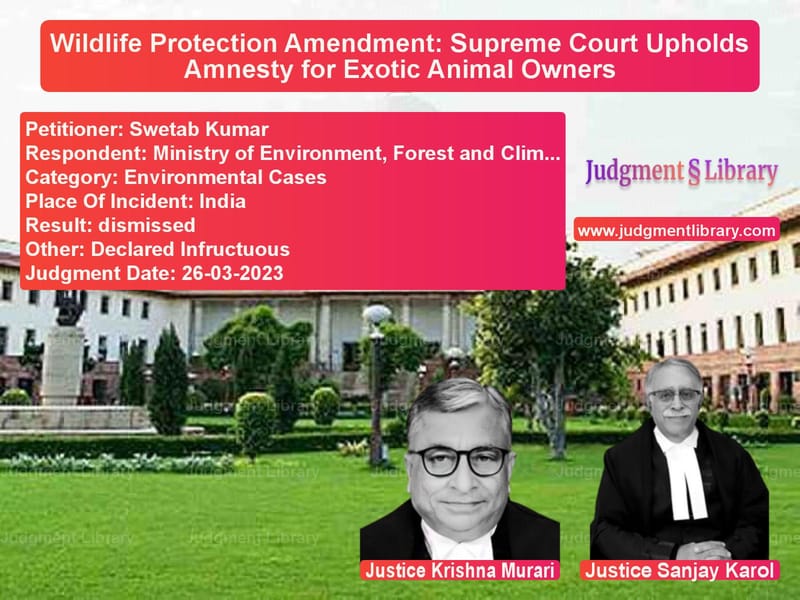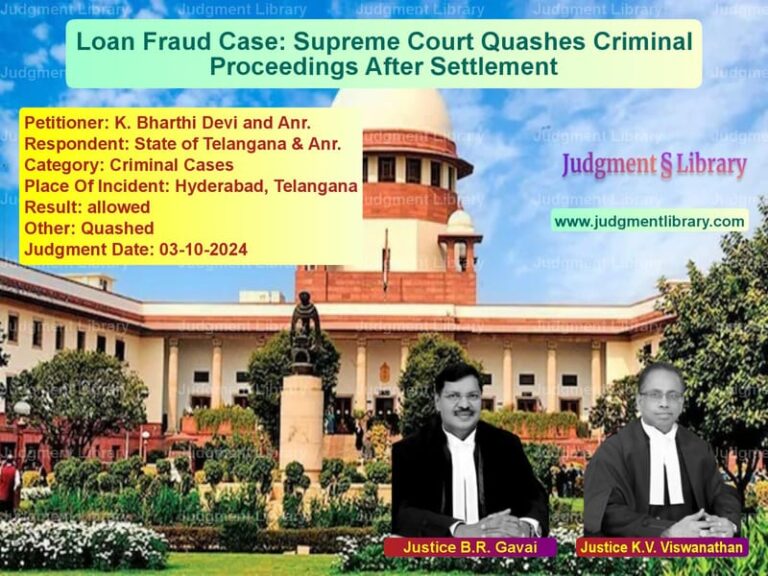Wildlife Protection Amendment: Supreme Court Upholds Amnesty for Exotic Animal Owners
The Supreme Court of India has ruled that individuals who declared possession of exotic animals under the 2020 Advisory issued by the Ministry of Environment, Forest, and Climate Change will remain immune from prosecution, even after the introduction of the Wild Life (Protection) Amendment Act, 2022. This decision came in response to a petition seeking clarification on whether the amendment nullifies the protection granted under the earlier advisory.
Background of the Case
The case revolves around the government’s attempt to regulate the import and possession of exotic live species of animals and birds in India. The Ministry of Environment, Forests, and Climate Change issued a notification on June 11, 2020, providing an Amnesty Scheme, allowing individuals to voluntarily declare their stock of exotic species without facing penalties.
The 2020 Advisory faced legal challenges in multiple High Courts, but was upheld in all cases. The Supreme Court also affirmed its validity on August 8, 2022, stating:
“Once a declaration within the window of six months as provided under the Advisory is made, the exotic live species, including its progeny, the declarant or transferee(s) are fully exempt from explaining the source of exotic live species.”
However, with the introduction of the Wild Life (Protection) Amendment Act, 2022, which brought exotic species under legal oversight, concerns arose about whether previous declarants would still be protected.
Arguments by the Petitioner (Swetab Kumar)
- The petitioner sought clarification on whether the Wild Life (Protection) Amendment Act, 2022, nullified the protection granted under the 2020 Advisory.
- They argued that the amendment imposed retrospective criminalization by bringing exotic species under the Wild Life (Protection) Act, 1972.
- It was contended that requiring fresh declarations under Section 49M of the amended Act would be unfair to those who had already complied with the 2020 Advisory.
Arguments by the Respondent (Ministry of Environment, Forest, and Climate Change)
- The government maintained that the 2022 amendment aimed to regulate the possession of exotic species but did not explicitly revoke the 2020 Advisory.
- They argued that individuals who failed to declare their exotic species under the advisory would now be required to register under the amended Act.
- They acknowledged that Rules under Section 49M were yet to be framed, leaving a gap in implementation.
Supreme Court’s Observations and Ruling
The Supreme Court examined the potential conflict between the 2020 Advisory and the 2022 amendment. It ruled that:
- The 2020 Advisory remains valid, and those who declared their exotic species under it cannot be prosecuted under the new amendment.
- The Advisory functioned as an Amnesty Scheme, offering immunity from prosecution, which cannot be revoked retrospectively.
- The new amendment cannot criminalize past possession of exotic species under Article 20(1) of the Indian Constitution, which prohibits retrospective criminal laws.
- The Advisory must be extended for at least six more months, allowing individuals who did not declare their stock earlier to do so.
- Future regulations must consider the rights of pet owners, traders, breeders, and conservationists, ensuring a balance between wildlife protection and legal fairness.
The Court emphasized:
“Since vide order dated 08.08.2022 it has been held that the Advisory was an Amnesty Scheme and declarants are immune from prosecution, the same would obviously mean that declarants are immune from prosecution or action under any future laws and amendments incorporated in the Wild Life (Protection) Act, 1972.”
Final Judgment
The Supreme Court dismissed the Miscellaneous Application, reaffirming that:
- Declarants under the 2020 Advisory will remain immune from prosecution.
- The government should extend the declaration window under the Advisory for at least six months.
- Rules under Section 49M of the amended Act must consider the concerns of pet owners and traders.
Implications of the Judgment
This ruling has far-reaching consequences:
- Legal Clarity: Ensures that those who complied with the Advisory are not unfairly prosecuted under the new law.
- Wildlife Protection: Strengthens the government’s ability to regulate exotic species while upholding fairness.
- Protection for Owners: Allows pet owners and breeders time to register their stock without fear of immediate prosecution.
- Policy Recommendations: Suggests the need for a transparent framework for exotic animal trade and ownership.
Conclusion
The Supreme Court’s decision strikes a balance between wildlife conservation and legal fairness. By upholding the validity of the 2020 Amnesty Scheme while allowing future regulation under the amended law, the ruling ensures that exotic animal owners are not unfairly penalized while promoting responsible ownership and conservation. The extension of the declaration window will further help in bringing all stakeholders into compliance with the law.
Petitioner Name: Swetab Kumar.Respondent Name: Ministry of Environment, Forest and Climate Change & Ors..Judgment By: Justice Krishna Murari, Justice Sanjay Karol.Place Of Incident: India.Judgment Date: 26-03-2023.
Don’t miss out on the full details! Download the complete judgment in PDF format below and gain valuable insights instantly!
Download Judgment: swetab-kumar-vs-ministry-of-environm-supreme-court-of-india-judgment-dated-26-03-2023.pdf
Directly Download Judgment: Directly download this Judgment
See all petitions in Environmental Cases
See all petitions in Judgment by Krishna Murari
See all petitions in Judgment by Sanjay Karol
See all petitions in dismissed
See all petitions in Declared Infructuous
See all petitions in supreme court of India judgments March 2023
See all petitions in 2023 judgments
See all posts in Environmental Cases Category
See all allowed petitions in Environmental Cases Category
See all Dismissed petitions in Environmental Cases Category
See all partially allowed petitions in Environmental Cases Category







